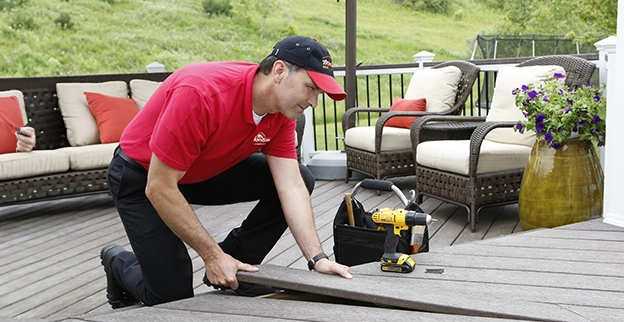Mostly wood is the most common deck material type. Also, just as a reminder, most Denton homeowners don’t have to commit to just one material as they can mix and match from a wide range of materials. For example, you may opt for wood for your front deck which is more of a porch style and fiberglass for your backdoor deck. Regardless of which type of material you go for, it will indicate how much effort you have to expend for routine maintenance and potential deck repairs in Denton, TX.
Wood/Pressure-Treated Wood: Pressure-treated wood is one of the popular requests as it resists wood rot decay and outlasts most organic or untreated wood so it’s more cost-effective. It’s also a natural pesticide as it wards off insects plus is resistant to moisture, fungus, and fire compared to generic wood. The only drawback is that it is more vulnerable to sun damage including direct sunlight exposure to UVA and UVB rays. So if you skip out on maintenance, you will quickly find that it will change in color, crack, or warp plus be exposed to mold and mildew growth. However, they’re not indestructible and should be kept clean at all times with periodic pressure washing and inspection.
Cedar Wood: If you’re looking for more of a rustic appeal cedar wood is great because it is durable, bodes well in fluctuating temperatures, isn’t prone to moisture damage, won’t warp or split, doesn't have to be stained as it is naturally resistant to wood rot and insects and overall requires less maintenance. The only drawback is that it’s more expensive to install as a superior wood product and fades to a pale gray over the years.
Redwood: This is another durable material that is resistant to insects and decay and doesn’t warp or split up easily. It gives a warm ambiance with this warm and reddish tone doesn’t need to be stained and lasts up to 20 years with proper upkeep. The only downside is that you have to be keen about maintaining redwood to keep the rich red color from going drab and being washed out. Whilst you're repairing and cleaning redwood decking you also have to be careful not to damage the wood as it can dent under heavy amounts of high pressure. But buyers should beware they may require a Denton deck repair, as redwood's softer and pliable materials mean that it does scuff up easily.
Aluminum: Although wood is the most commonly used for decks in Denton, sometimes homeowners want to change things up with other materials. Aluminum is sturdy, doesn’t crack, warp, or rust, and is mold-resistant. As a lightweight and durable material, it’s a good swap out for wood but one downside is that it's sensitive to heavy foot traffic in terms of noise pollution and gets incredibly slippery during the winter months.
Steel: Again, unusually uncommon but also a doable material. Steel is quite durable, bodes well in moist environments, and can handle fluctuating temperatures and pressure including being resistant to fire. The only downside is that you have to put up with doing extra chores as it does require the occasional power washing service to get rid of all the built-up dirt and debris as outrightly ignoring this means it will rust. Corrosion on a deck occurs if it’s exposed to water moisture, oxygen, and extreme temperatures for a long time. If you notice discolored rust don’t be surprised to see leakages on your deck too.
Fiberglass: This classy material is becoming a favorite option on the backside of houses as it’s lightweight, waterproof, has lighting, and has minimal maintenance costs. Plus who doesn't love the luxe appeal that glass offers? The only drawback is that if any hairline cracks or fractures appear they are difficult to mend and can’t easily be fixed let alone at all.
Vinyl: Plastic is a good choice if you want something waterproof, plus it can be customized with different colors and designs. For example, a wood-grain palette copycats real wood. But it comes with an expensive price tag, and since it’s not an organic material like wood or metal like steel, it can’t be refinished. For example, your handyman will have to be careful to pick up and discard any plastic waste so as not to harm the environment. However, vinyl is not recommended if your backyard is exposed to the sun a lot because it can easily become heat-damaged, resulting in buckling and warping.
Composite: Composite decking is made from recycled materials and is gaining in popularity for its consistent look and minimal maintenance. No need to worry about deck maintenance because regular cleaning can be handled with a hose. Also, the boards are nearly identical and warp and knot-free. However, composite decking is typically more expensive in the short term, but the costs saved on future cleaning, re-staining, and deck repair may make it the more economical long-term option.
